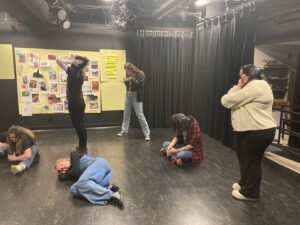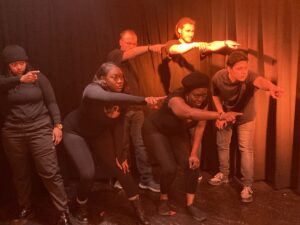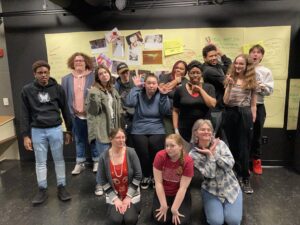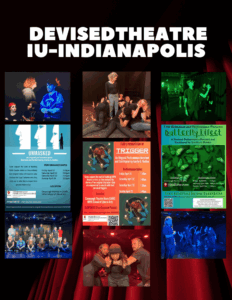What is “devised theatre” and how does it inform the productions at IU-Indianapolis?
In devised theatre, no one knows what the final product will look like—not the performers, nor the creative team. They start with an idea, a question, a theme, a piece of music, an image — or any number of interdisciplinary inspirations — and build innovative performances. Although there are varied definitions and connotations to the terms devised and devising, there are several key elements that characterize it.
First, devising includes a process of theatre-making where there is collaborative choice-making to create something completely new. Second, the creators of the work, are (most often) also the performers of it. Third, devising is experimental and exploratory in nature, which invites a “What If?” type laboratory space of theatrical trial and error. Finally, because of the third element, devised work often transgresses conventional structures and stylistic rules. This makes it open to integrating a variety of artforms, such as poetry, dance and video, in addition to traditional acting and scene work.
Devised theatre is the basis for the productions at IU-Indianapolis. Because of the intense process involved, the shows coincide with curricular coursework. Students selected as part of each production’s ensemble of collaborators enroll in a three-credit course T100: Devising Issue-Based Theatre (formerly called Rehearsal and Performance). This course equally serves Gen Ed Electives, the Theatre Minor, the Theatre Certificate, and students enrolled in the Applied Theatre Concentration. Therefore it benefits from interdisciplinary perspectives, and varying levels of theatre savvy to authentically inform the process, in service to he work of art that is generated by each ensemble.

T100 Ensemble Members from the spring of 2024 use their bodies to explore spectrums of wellness for generating characters, dialogue and plot ideas.
Despite their different backgrounds all participants are united by common goals and purposes:
What strategic benefits and skills are gained from working on devised pieces as part of this specialized program?
As a future practitioner, being part of a devising process in the Applied Theatre Concentration prepares you to be a performance writer that is versed in numerous “languages” of the theatre (architecture of the space, audience/performer relationship, gesture, movement, sound, text etc.) that are adaptable to the diverse settings where applied theatre is practiced. Receiving exposure and training in devised theatre also empowers students to be “art-renpreneurs” that are capable of always working. The ability to constantly generate one’s own material (whether individually or with other collaborators), means that performing “conventional” play scripts is a choice (not a necessity) to be seen or have one’s artistic voice heard.
Though there are numerous methodologies and techniques implemented to generate raw material for devising, of equal importance is the Applied Theatre Concentration’s exposure to students of ways to co-create theatre with different communities. The uplifting examination of untold stories, the increased personal connectivity, and the dialogues facilitated (with both participants and audience members) by devising lead to individual and societal changes. Not only do these outcomes align with Applied Theatre teaching artistry, they also pay homage to core roots of the Greek theatre and other global ritualistic traditions, where theatre is seen as a “medicinal seeing place”.

T100 Ensemble Members from Spring 2023’s production of TRIGGER accentuate the delivery of a character’s monologue with lyrical movement.

BUTTERFLY EFFECT T100 Ensemble Member Emma Adams, lingers on a poetic and reflective moment near the performance’s ending, with the help of a symbolic design element. Emma knows — that ARTISTS MAKE CHOICES!

Ensemble Members from 2022’s performance of UNMASKED, take time to “crack their façades of seriousness” after a long deliberation about the mission statement for their piece. A little humor doesn’t hurt and helps to break the artistic tension, folks!

What are recent examples of productions that IU-Indianapolis students have devised and performed? How have these connected to Applied Theatre processes and outcomes with their chosen artistic inquiries, missions or topics?
Emilio G. Robles
Assistant Professor in Applied Theatre and Teaching Artist
CA 307B
317-274-2060
egrobles@iu.edu